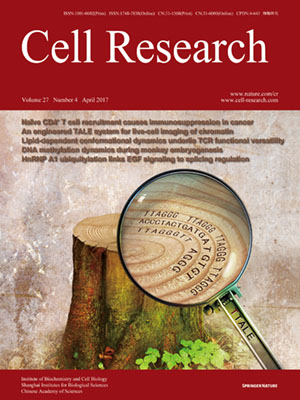
Volume 27, No 4, Apr 2017
ISSN: 1001-0602
EISSN: 1748-7838 2018
impact factor 17.848*
(Clarivate Analytics, 2019)
Volume 27 Issue 4, April 2017: 559-577
ORIGINAL ARTICLES
Mesenchymal stem cell transplantation in tight-skin mice identifies miR-151-5p as a therapeutic target for systemic sclerosis
Chider Chen1, Dandan Wang2, Alireza Moshaverinia3, Dawei Liu1, Xiaoxing Kou1, Wenjing Yu1, Ruili Yang1, Lingyun Sun2 and Songtao Shi1
1Department of Anatomy and Cell Biology, University of Pennsylvania, School of Dental Medicine, Philadelphia, PA 19104, USA;
2Department of Rheumatology and Immunology, The Affiliated Drum Tower Hospital of Nanjing University Medical School, 321 Zhongshan Road, Nanjing, Jiangsu 210008, China;
3Division of Advanced Prosthodontics, Weintraub Center for Reconstructive Biotechnology, School of Dentistry, University of California, Los Angeles, CA 90095, USA
Correspondence: Songtao Shi, Tel: 215-898-3326; Fax: 215-573-5032 E-mail: songtaos@dental.upenn.edu; Lingyun Sun,(lingyunsun2012@163.com)
Systemic sclerosis (SSc), an autoimmune disease, may cause significant osteopenia due to activation of the IL4Rα/mTOR pathway. Mesenchymal stem cell transplantation (MSCT) can ameliorate immune disorders in SSc via inducing immune tolerance. However, it is unknown whether MSCT rescues osteopenia phenotype in SSc. Here we show that MSCT can effectively ameliorate osteopenia in SSc mice by rescuing impaired lineage differentiation of the recipient bone marrow MSCs. Mechanistically, we show that donor MSCs transfer miR-151-5p to the recipient bone marrow MSCs in SSc mice to inhibit IL4Rα expression, thus downregulating mTOR pathway activation to enhance osteogenic differentiation and reduce adipogenic differentiation. Moreover, systemic delivery of miR-151-5p is capable of rescuing osteopenia, impaired bone marrow MSCs, tight skin, and immune disorders in SSc mice, suggesting that miR-151-5p may be a specific target for SSc treatment. Our finding identifies a previously unrecognized role of MSCT in transferring miRNAs to recipient stem cells to ameliorate osteopenia via rescuing a non-coding RNA pathway.
10.1038/cr.2017.11
FULL TEXT | PDF
Browse 1935


